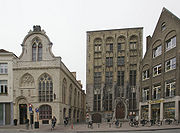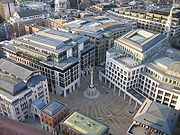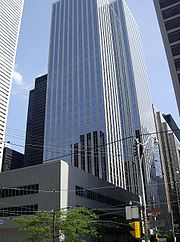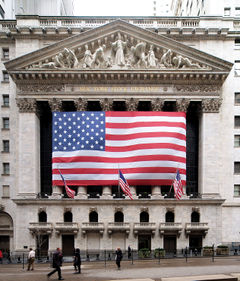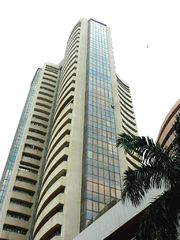Stock exchange
A stock exchange is an entity which provides "trading" facilities for stock brokers and traders, to trade stocks and other securities. Stock exchanges also provide facilities for the issue and redemption of securities as well as other financial instruments and capital events including the payment of income and dividends. The securities traded on a stock exchange include shares issued by companies, unit trusts, derivatives, pooled investment products and bonds.
To be able to trade a security on a certain stock exchange, it has to be listed there. Usually there is a central location at least for recordkeeping, but trade is less and less linked to such a physical place, as modern markets are electronic networks, which gives them advantages of increased speed and reduced cost of transactions. Trade on an exchange is by members only.
The initial offering of stocks and bonds to investors is by definition done in the primary market and subsequent trading is done in the secondary market. A stock exchange is often the most important component of a stock market. Supply and demand in stock markets is driven by various factors which, as in all free markets, affect the price of stocks (see stock valuation).
There is usually no compulsion to issue stock via the stock exchange itself, nor must stock be subsequently traded on the exchange. Such trading is said to be off exchange or over-the-counter. This is the usual way that derivatives and bonds are traded. Increasingly, stock exchanges are part of a global market for securities.
Contents |
The first stock exchanges
In 12th century France the courtiers de change were concerned with managing and regulating the debts of agricultural communities on behalf of the banks. As these men also traded in debts, they could be called the first brokers.
Some stories suggest that the origins of the term "bourse" came from the Latin bursa meaning a bag because, in 13th century Bruges, the sign of a purse (or perhaps three purses), hung on the front of the house where merchants met.
The story may well be apocryphal, however it is possible that in the late 13th century commodity traders in Bruges gathered inside the house of the Van der Burse family (for some a Venetian family with original name "Della Borsa" and three leather bags as coat-of-arms), and in 1309 they institutionalized this until now informal meeting and became the "Bruges Bourse." The idea spread quickly around Flanders and neighboring counties and "Bourses" soon opened in Ghent and Amsterdam.
In the middle of the 13th century, Venetian bankers began to trade in government securities. In 1351, the Venetian Government outlawed spreading rumors intended to lower the price of government funds. There were people in Pisa, Verona, Genoa and Florence who also began trading in government securities during the 14th century. This was only possible because these were independent city states ruled by a council of influential citizens, not by a duke.
The Dutch later started joint stock companies, which let shareholders invest in business ventures and get a share of their profits—or losses. In 1602, the Dutch East India Company issued the first shares on the Amsterdam Stock Exchange. It was the first company to issue stocks and bonds. In 1688, the trading of stocks began on a stock exchange in London.
On May 17, 1792, in order to more easily trade cotton, twenty-four supply brokers signed the Buttonwood Agreement outside 68 Wall Street in New York underneath a buttonwood tree. On March 8, 1817, properties got renamed to New York Stock & Exchange Board. In the 19th century, exchanges (generally famous as futures exchanges) got substantiated to trade futures contracts and then choices contracts.
There are now a large number of stock exchanges in the world.
The role of stock exchanges
Stock exchanges have multiple roles in the economy. This may include the following:[1]
Raising capital for businesses
The Stock Exchange provide companies with the facility to raise capital for expansion through selling shares to the investing public.[2]
Mobilizing savings for investment
When people draw their savings and invest in shares, it leads to a more rational allocation of resources because funds, which could have been consumed, or kept in idle deposits with banks, are mobilized and redirected to promote business activity with benefits for several economic sectors such as agriculture, commerce and industry, resulting in stronger economic growth and higher productivity levels of firms.
Facilitating company growth
Companies view acquisitions as an opportunity to expand product lines, increase distribution channels, hedge against volatility, increase its market share, or acquire other necessary business assets. A takeover bid or a merger agreement through the stock market is one of the simplest and most common ways for a company to grow by acquisition or fusion.
Profit sharing
Both casual and professional stock investors, through dividends and stock price increases that may result in capital gains, will share in the wealth of profitable businesses.
Corporate governance
By having a wide and varied scope of owners, companies generally tend to improve on their management standards and efficiency in order to satisfy the demands of these shareholders and the more stringent rules for public corporations imposed by public stock exchanges and the government. Consequently, it is alleged that public companies (companies that are owned by shareholders who are members of the general public and trade shares on public exchanges) tend to have better management records than privately held companies (those companies where shares are not publicly traded, often owned by the company founders and/or their families and heirs, or otherwise by a small group of investors).
Despite this claim, some well-documented cases are known where it is alleged that there has been considerable slippage in corporate governance on the part of some public companies. The dot-com bubble in the late 1990's, and the subprime mortgage crisis in 2007-08, are classical examples of corporate mismanagement. Companies like Pets.com (2000), Enron Corporation (2001), One.Tel (2001), Sunbeam (2001), Webvan (2001), Adelphia (2002), MCI WorldCom (2002), Parmalat (2003), American International Group (2008), Bear Stearns (2008), Lehman Brothers (2008), General Motors (2009) and Satyam Computer Services (2009) were among the most widely scrutinized by the media.
However, when poor financial, ethical or managerial records are known by the stock investors, the stock and the company tend to lose value. In the stock exchanges, shareholders of underperforming firms are often penalized by significant share price decline, and they tend as well to dismiss incompetent management teams.
Creating investment opportunities for small investors
As opposed to other businesses that require huge capital outlay, investing in shares is open to both the large and small stock investors because a person buys the number of shares they can afford. Therefore the Stock Exchange provides the opportunity for small investors to own shares of the same companies as large investors.
Government capital-raising for development projects
Governments at various levels may decide to borrow money in order to finance infrastructure projects such as sewage and water treatment works or housing estates by selling another category of securities known as bonds. These bonds can be raised through the Stock Exchange whereby members of the public buy them, thus loaning money to the government. The issuance of such bonds can obviate the need to directly tax the citizens in order to finance development, although by securing such bonds with the full faith and credit of the government instead of with collateral, the result is that the government must tax the citizens or otherwise raise additional funds to make any regular coupon payments and refund the principal when the bonds mature.
Barometer of the economy
At the stock exchange, share prices rise and fall depending, largely, on market forces. Share prices tend to rise or remain stable when companies and the economy in general show signs of stability and growth. An economic recession, depression, or financial crisis could eventually lead to a stock market crash. Therefore the movement of share prices and in general of the stock indexes can be an indicator of the general trend in the economy.
Major stock exchanges
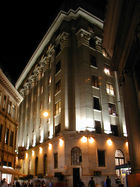
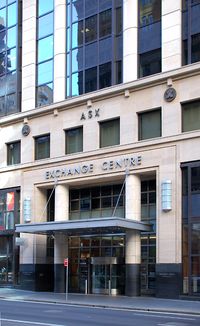
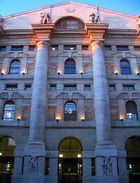
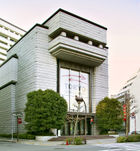
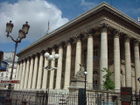

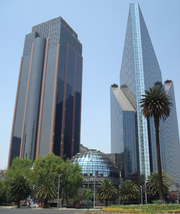
Major Stock Exchanges : Year ended 31 October 2010
Source: World Federation of Exchanges - Statistics/Monthly
| Economy | Stock Exchange | Market Capitalization (USD Billions) |
Trade Value (USD Billions) |
|---|---|---|---|
| New York Stock Exchange | 12826 | 13991 | |
| NASDAQ | 3653 | 8282 | |
| London Stock Exchange | 3598 | 2074 | |
| Tokyo Stock Exchange | 3469 | 3306 | |
| Euronext | 2989 | 1584 | |
| Shanghai Stock Exchange | 2803 | 5514 | |
| Hong Kong Stock Exchange | 2679 | 1740 | |
| Toronto Stock Exchange | 1963 | 1100 | |
| Bombay Stock Exchange | 1627 | 264 | |
| National Stock Exchange of India | 1588 | 809 | |
| BM&F Bovespa | 1504 | 880 | |
| Deutsche Börse | 1393 | 1167 | |
| Australian Securities Exchange | 1341 | 942 | |
| BME Spanish Exchanges | 1247 | 1492 | |
| Shenzhen Stock Exchange | 1246 | 3884 | |
| SIX Swiss Exchange | 1140 | 619 | |
| Korea Exchange | 1013 | 1525 |
The main stock exchanges:
- American Stock Exchange
- Australian Securities Exchange
- Athens Stock Exchange
- Belgrade Stock Exchange
- Berliner Börse
- Bermuda Stock Exchange
- Bolsa Mexicana de Valores
- Bolsa de Valores de Colombia
- Bolsa de Valores de Lima
- Bombay Stock Exchange
- Bucharest Stock Exchange
- Budapest Stock Exchange
- Bulgarian Stock Exchange - Sofia
- Cairo & Alexandria Stock Exchange
- Casablanca Stock Exchange
- Channel Islands Stock Exchange
- Chicago Stock Exchange
- Czech Stock Exchange - RM-SYSTÉM
- Euronext Amsterdam
- Euronext Brussels
- Euronext Lisbon
- Euronext Paris
- Frankfurt Stock Exchange
- Ghana Stock Exchange
- Helsinki Stock Exchange
- Hong Kong Stock Exchange
- Indonesia Stock Exchange
- Istanbul Stock Exchange
- JASDAQ
- JSE Securities Exchange
- Karachi Stock Exchange
- Korea Stock Exchange
- Kuwait Stock Exchange
- London Stock Exchange
- Madrid Stock Exchange
- Malaysia Stock Exchange
- Milan Stock Exchange
- Montreal Stock Exchange
- Nagoya Stock Exchange
- National Stock Exchange of India
- New York Stock Exchange
- New Zealand Exchange
- Nigerian Stock Exchange
- Osaka Securities Exchange
- Philippine Stock Exchange
- Santiago Stock Exchange
- São Paulo Stock Exchange (BOVESPA)
- Shanghai Stock Exchange
- Shenzhen Stock Exchange
- Singapore Exchange
- Stockholm Stock Exchange
- Stock Exchange of Thailand
- Taiwan Stock Exchange
- Tehran Stock Exchange
- Tel Aviv Stock Exchange
- Tokyo Stock Exchange
- Toronto Stock Exchange
- Warsaw Stock Exchange
- Zurich Stock Exchange
See also: Category:Stock exchanges
Listing requirements
Listing requirements are the set of conditions imposed by a given stock exchange upon companies that want to be listed on that exchange. Such conditions sometimes include minimum number of shares outstanding, minimum market capitalization, and minimum annual income.
Requirements by stock exchange
Companies have to meet the requirements of the exchange in order to have their stocks and shares listed and traded there, but requirements vary by stock exchange:
- Bombay Stock Exchange: Bombay Stock Exchange (BSE) has requirements for a minimum market capitalization of Rs.250 Million and minimum public float equivalent to Rs.100 Million.[3]
- London Stock Exchange: The main market of the London Stock Exchange has requirements for a minimum market capitalization (£700,000), three years of audited financial statements, minimum public float (25 per cent) and sufficient working capital for at least 12 months from the date of listing.
- NASDAQ Stock Exchange: To be listed on the NASDAQ a company must have issued at least 1.25 million shares of stock worth at least $70 million and must have earned more than $11 million over the last three years.[4]
- New York Stock Exchange: To be listed on the New York Stock Exchange (NYSE) a company must have issued at least a million shares of stock worth $100 million and must have earned more than $10 million over the last three years.[5]
Ownership
Stock exchanges originated as mutual organizations, owned by its member stock brokers. There has been a recent trend for stock exchanges to demutualize, where the members sell their shares in an initial public offering. In this way the mutual organization becomes a corporation, with shares that are listed on a stock exchange. Examples are Australian Securities Exchange (1998), Euronext (merged with New York Stock Exchange), NASDAQ (2002), the New York Stock Exchange (2005), Bolsas y Mercados Españoles, and the São Paulo Stock Exchange (2007). The Shenzhen and Shanghai stock exchanges can been characterized as quasi-state institutions insofar as they were created by government bodies in China and their leading personnel are directly appointed by the China Securities Regulatory Commission.
Other types of exchanges
In the 19th century, exchanges were opened to trade forward contracts on commodities. Exchange traded forward contracts are called futures contracts. These commodity exchanges later started offering future contracts on other products, such as interest rates and shares, as well as options contracts. They are now generally known as futures exchanges.
Gallery
 Milan Stock Exchange |
 Paris Stock Exchange |
||
 Madrid Stock Exchange |
 SWX Swiss Exchange |
 Osaka Securities Exchange |
 São Paulo Stock Exchange |
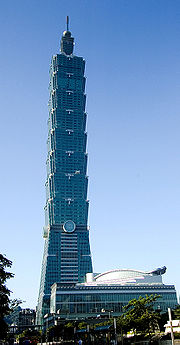 Taiwan Stock Exchange |
 Shanghai Stock Exchange |
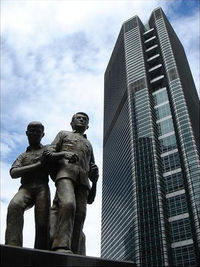 Philippine Stock Exchange |
See also
- Auction
- Capital market
- Commodities exchange
- Financial regulation
- International Organization of Securities Commissions
- List of financial regulatory authorities by country
- List of Swiss financial market legislation
- Securities
- Shareholder
- Stag profit
- Stock exchanges for developing countries
- Stock investor
- Stock market
- Trader (finance)
Lists
- List of stock exchanges
- List of stock market indices
- List of marketing topics
- List of management topics
- List of economics topics
- List of accounting topics
- List of finance topics
Notes
- ↑ Diamond, Peter A. (1967). "The Role of a Stock Market in a General Equilibrium Model with Technological Uncertainty". American Economic Review 57 (4): 759–776. http://www.jstor.org/pss/1815367.
- ↑ Gilson, Ronald J.; Black, Bernard S. (1998). "Venture Capital and the Structure of Capital Markets: Banks Versus Stock Markets". Journal of Financial Economics 47: 243–277. doi:10.2139/ssrn.46909.
- ↑ About Us
- ↑ NASDAQ Corporate -NASDAQ Listing Information
- ↑ http://www.nyse.com/Frameset.html?displayPage=/listed/1022540125610.html
External links
|
|||||||||||||||||||||||
